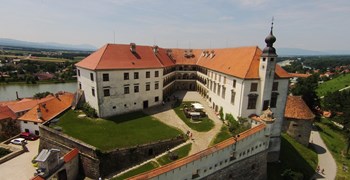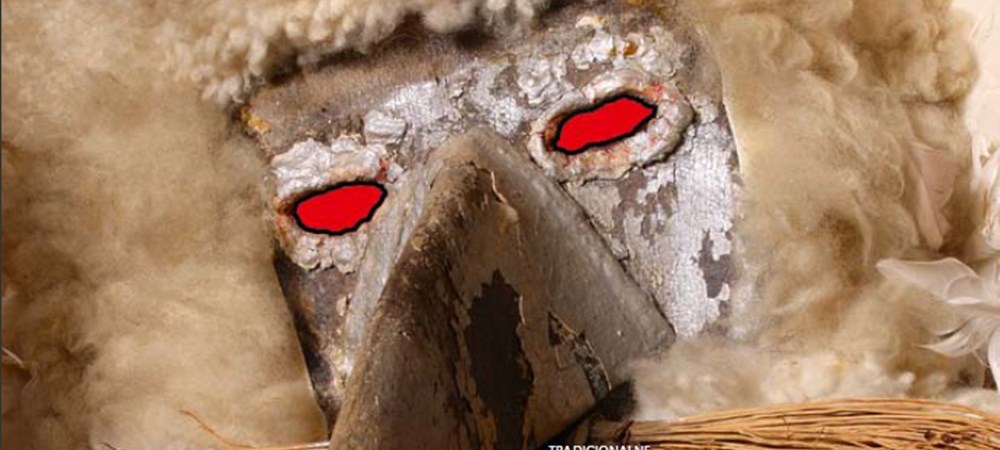Traditional carnival masks in the area of Ptuj
Excerpts from the book by Andrej Brence, Traditional carnival masks in the area of Ptuj (Regional Museum Ptuj - Ormož, 2011)
On the carnival day the food had to be abundant and fat. From this habit derive both expressions: fat Saturday and fat Sunday. Women would cook and bake pork, poultry, turnips, cabbage and doughnuts in every house from early morning. Traditional dishes cooked for the carnival day were krhlenka – turnips cut into quarters or cubes, pork head and muzzle. (Page 28)

Krhlenka - carnival dish
CARNIVAL PLOUGHMEN
The carnival ploughing is a very popular custom in which two long-forgotten ritual acts combine – the ploughing of the magic defence circle around a village to protect it from evil influences, and the solemn ploughing of the first furrow at the beginning of work in fields. This custom is known in all regions where tilling the soil by ploughing is practised. As such, the ploughmen cannot be considered as a local particularity, for they are known in other parts of Slovenia and in Europe.
Groups of orači (ploughmen) usually consist of a pokač (cracker), a pobirač (collector of donations), konjiči (two or three pairs of »horses«), a plužar (plougher) and a few korants who, on the farmyard, symbolically plough a furrow and sow seeds for »fat turnips« and abundant crops in fields. During the ritual each member of the group performs a specific function: the cracker announces their arrival by cracking his whip, the horses drag the plough, one korant ploughs while others jump and make terrible noise with their bells, the collector sows and collects presents for the work done. The ploughmen, as a collective carnival mask, bring people something positive, while the korant plays a double role in the group, for it is the only mask to bestow punishments on people. When the ploughmen are welcome they perform their ritual for the common joy and happiness, but if they are refused the korant rolls itself on the ground thus predicting un unhappy year to come. Very few people refuse ploughmen, for they do care about what is to come. Groups are basically the same in terms of number of members and their functions, but they differ in the outer appearance.
Written and oral sources testify for the huge number of ploughmen. Especially older writings and reports devoted much more attention to them than to any other mask which clearly shows their importance, popularity and belief in their magic acts. (Pages 32-33)

Cracker
THE RUSA
The rusa is an animal mask supposed to have an influence on the reproduction and health of horses and cattle. The mask is known elsewhere in Slovenia and also in Europe especially in areas living on horse-breeding. The rusa makes individual rounds through villages and also performs at organised carnival events, very often together with the ploughmen. There are two types of rusa – a four-legged and a two-legged. The four-legged rusa, also known as camel, is animated by two boys. They put on a wooden framework almost two metres long to the longer sides of which several bent branches are attached. The framework is covered with a tilt. A head is attached at the front, but it can also be mounted on a wooden pole in order to be moved by the first boy. The head is normally upholstered with fur, has drawn-on or riveted eyes and ears and a mobile lower jam moved by means of a string. (Page 67)

The Rusa
In 2010, the organised carnival event – Kurentovanje – celebrated its 50th anniversary. Although known as the most prominent carnival event, it is far from being the only one in the region. A few years ago, other carnival processions – Fašenki started in the villages of Markovci (1992), Cirkovce (1993), Cirkulane (1994), Dornava and Videm (1996), and a few more. These carnival events normally last from Carnival Saturday until Tuesday, and more or less copy the Sunday procession in Ptuj by including the traditional and modern groups in the procession. Therefore the majority of masked groups, be it traditional or modern, are much demanded by the organisers of all these carnival events. But, to respond favourably to all these events, it all depends on people's time and willingness to participate. (Page 101)

Little korants












